Translations 677
Notes of A Veteran Fidelista
Notes of a Veteran Fidelista
By Ricardo Alarcón de Quesada
A CubaNews translation.
Edited by Walter Lippmann.
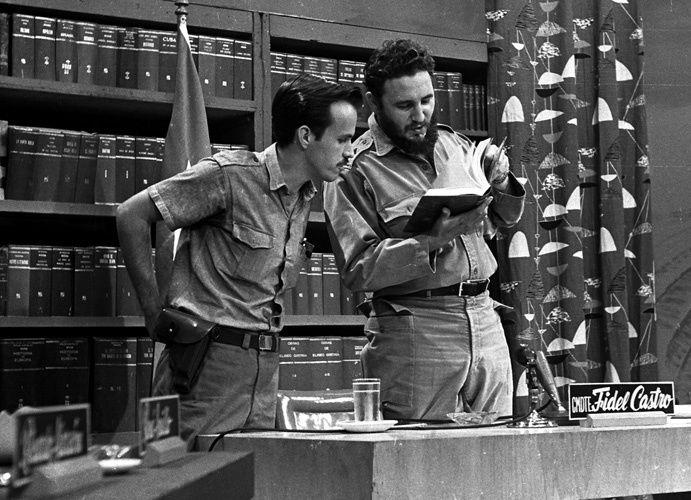
Ricardo Alarcón and Fidel Castro Ruz, Popular University Program, circa 1960- Photo: Liborio Noval.
On March 10, 1952, with a door slam, a chapter of Cuban history came to a close. Fulgencio Batista –who, two decades before, had introduced a harsh dictatorship– seized power once again with a handful of his former collaborators had liquidated the revolutionary government of just one hundred days which had emerged in 1933 after the fall of Gerardo Machado. The new coup took place without major setbacks and thus ended Cuba’s brief experience with “representative democracy”. This had lasted for only two terms of the Cuban Revolutionary Party (Autentico), which had governed for little more than seven years.
The “Autentico” Party presented itself as heir to the Revolution of 1933, in which its leaders had had played an outstanding role, but did not go beyond national-reformism, creating some necessary institutions and showing an independent foreign policy on some important issues at the UN and the OAS. Its work was, however, hampered by government corruption which invaded almost all branches of the administration. Besides, its adherence to McCarthyism led to the division among the trade union and popular movement, and the assassination of some of its main leaders.
The prevailing dishonesty caused the split in the “Autentico” Party and the emergence of the Cuban People’s Party (Orthodox) which raised the slogan “Vergüenza contra Dinero [Shame against money]” as its main banner. Among its founders was a recently graduated lawyer named Fidel Castro Ruz.
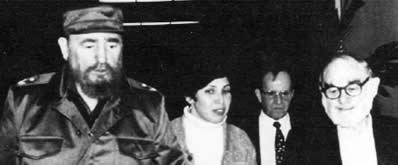
Fidel Castro, Juana Vera, Victor Rabinowitz and the author in Havana.
The general elections scheduled for June 1952, brought face-to-face, according to all polls, two candidates: the “orthodox”, headed by a respected university professor [Roberto Agramonte], and the government official, led by an “autentico” whose honesty was beyond doubt. A third candidate, Batista, supported by reactionary groups, appeared in a distant last place and no one gave him the slightest chance of winning in the polls. Everyone in Cuba knew this, including Batista who, for that reason, prevented the people from deciding.
The coup and its immediate aftermath deeply wounded Cuban society. Batista received immediate support from the big property owners as well as from the conservative political forces and corrupt trade union bureaucracy. Political parties –the ones close to the government as well their opponents– were trapped in inaction and inconsistency. Authenticism and orthodoxy were divided into contradictory trends and new parties emerged from them; some willing to collaborate or compromise with the new regime. These and all other parties engaged in endless controversies unable to articulate a path against tyranny.
Resistance found refuge in the universities. Out of these came the first demonstrations and acts of protest. Among the students there was a growing awareness of the need to act and to do so using methods different from those of the politicians who had failed miserably. There was talk of armed struggle, but nobody knew how to wage it or had the resources to undertake it. There were some isolated attempts while rumors spread about plans led or linked to the president overthrown on March 10.
For those of us who were still in secondary education, the assault on the military barracks in Santiago de Cuba (Moncada) and Bayamo (Carlos Manuel de Cespedes), on July 26, 1953, was a complete surprise. We knew nothing of an event that would change our lives forever.
The news highlighted the name of someone previously unknown to us: Fidel Castro.
The political crisis deepened. The tyranny became even more aggressive. The Communist Party (Partido Socialista Popular [Socialist People’s Party]) was banned and its publications closed, while increased repression against the student movement became the norm. Batista’s accusations against the Communists sought the sympathy of Washington, but had nothing to do with reality. The PSP was not only alien to those events, but rather condemned the action of the young revolutionaries as did the other opponents to Batista, almost without exception.
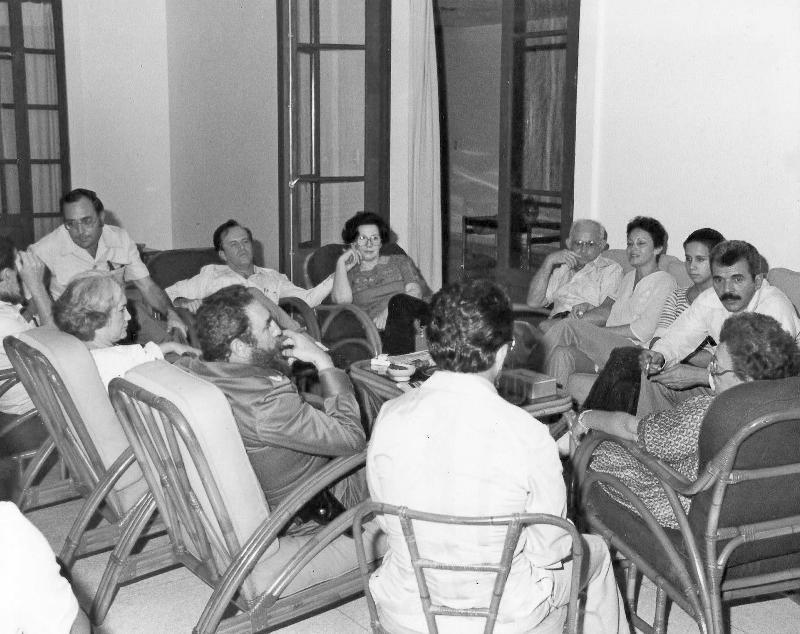
With Puerto Rican Independentists, Lolita Lebrón, Rafael Cancel Miranda, Irving Flores and Oscar Collazo, Havana 1979.
Once again it fell to the students to replace the parties that had proved incapable of fulfilling their role. The Federation of University Students (FEU) sympathized with the attackers of the Moncada garrison and called for a campaign for their release. This soon acquired a national dimension and forced the dictatorship to grant them amnesty in 1955.
That same year, Fidel founded the July 26th Movement. Along with the survivors of the initial action, it counted especially on young people who, in neighborhoods and study centers, identified themselves with that heroic deed against tirades and criticism from Tiryns and Trojans.
Their ranks were filled with youths, no few of them teenagers, who rebelled amid frustration, inertia and division, inspired by a feat that had shaken the tyranny and its opponents as well. Antonio López (Ñico), who had led the attack on the barracks in Bayamo, was responsible for organizing the youth brigades of the M-26-7 until he went to Mexico to return with Fidel and die fighting in the Sierra Maestra. He was replaced in Havana by Gerardo Abreu (Fontán), a black man of very humble origin, who had not completed primary school. He managed, on his own, to acquire a broad cultural background and a poetic sensibility that caused astonishment among us college students who had the privilege of fighting under his leadership. Ñico and Fontán –both from the Orthodox Youth– knew Marxism, shared socialist ideals, and were profoundly anti-imperialist. They were determined to create an organization that would massively bring in the new generation. They succeeded. Their followers were identified with a single word: “fidelistas”.
The presence of the Brigades was felt quickly by sending their message directly to the people. While the press and politicians criticized Fidel and the Moncada action, everywhere, in every corner of the capital –on walls and facades– using very modest resources, Brigade members painted a brief slogan which everyone understood: M-26-7, or a name that others wanted to silence: Fidel.
In view of the hostile environment which made it impossible to wage open political struggle, Fidel went to Mexico in order to organize the return to carry out the battle that would end the tyranny. He proclaimed it openly, undertaking a historic commitment: “In ’56, we will be free or we will be martyrs” thus challenging the followers of inaction and despair once again. And also their jokes: a government newspaper carried on its front page every day the number of days which had elapsed that year without the defiant promise being kept. 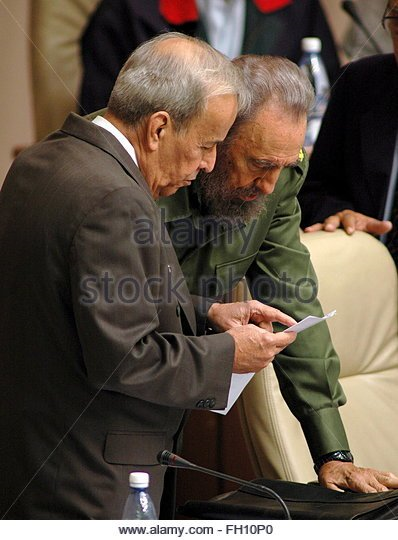
Well into November, the propaganda against the Moncadistas intensified. Demonstrations, organized by the FEU and the newly created Revolutionary Directorate, climaxed and led to the closure of the university. The last day of the month, to support the landing [of the Granma expedition], the M-26-7 carried out an uprising in Santiago de Cuba. Two days later Fidel and his companions arrived at the eastern shores aboard the yacht Granma, in what Che described as a “shipwreck”.
Scattered and persecuted by the Army, a small group finally managed to reunite in the Sierra Maestra. Many members of the expedition died fighting, or were assassinated.
Among these, as the US news agencies reported, was its main leader. Fidel’s death was reported on the front page of every newspaper. Anguish and uncertainty remained until after a passage of time that seemed endless. Gradually and by clandestine channels, the truth came to be known.
The last two years of the dictatorship were rife with crimes and abuses in the urban areas while the initial guerrilla force grew to become the Rebel Army.
“Fidelismo” reached massiveness. On the night of November 8, 1957, one hundred simultaneous explosions rocked Havana, each in a different neighborhood and distant from one another. They were practically heavy firecrackers –rather homemade devices– that only made noise. No one was injured and no one was arrested by the police who went around frantically from one place to the other. It was sound evidence that the “26th” was everywhere and showed the youth brigades’ efficient organization.
The murder of Fontan, on February 7, 1958, sparked a students’ general strike which lasted until May. It paralyzed all education centers, including private universities and academies, and led to the consecutive resignations of two of Batista’s Education Ministers of Batista.
Never before had such a movement occurred in Cuba to such extent and for so long. For three months, all attempts, violent or “peaceful” to end it failed. The student walkout continued, even several weeks after the movement suffered in its most painful and bloody defeat in Havana.
The failure of the attempted general strike by the workers, on April 9, was a very severe blow. It decimated urban militancy, almost completely destroyed the underground structures, and allowed the dictatorship to mobilize thousands of troops to launch what it thought would be the final battle in the Sierra. Once again everything depended on Fidel and his leadership.
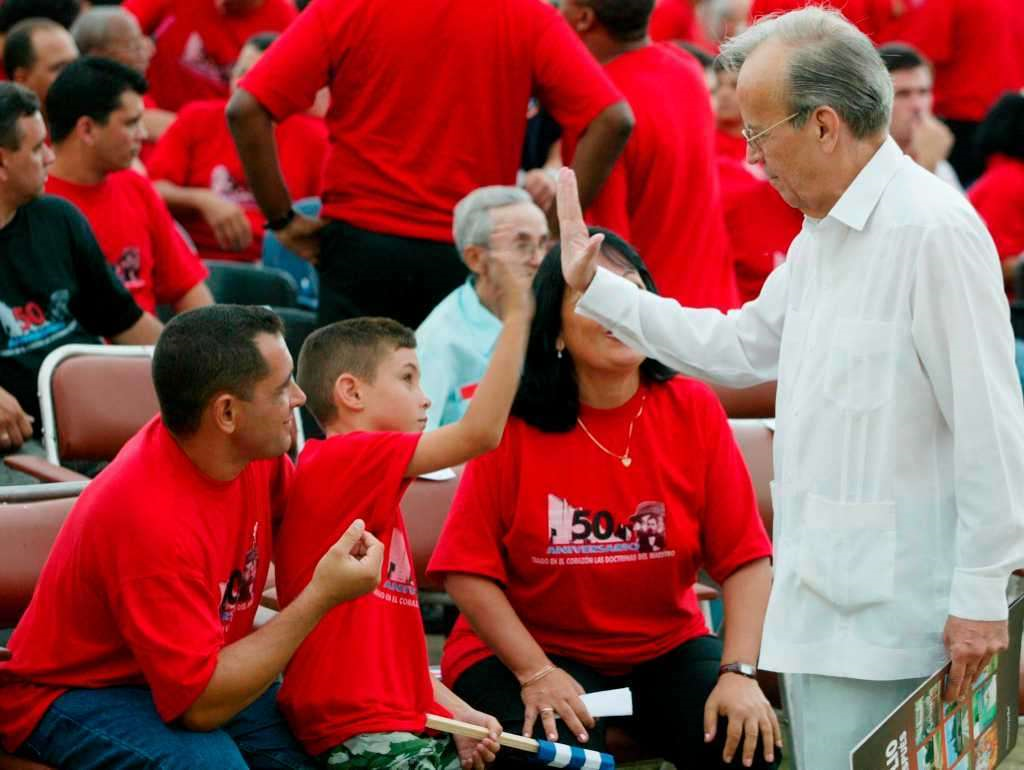
PHOTO Elian and Juan Miguel Gonzalez, at the Celebration of the 50th Anniversary of the Moncada assault.
Batista’s offensive proved a complete failure. The Rebel Army –well-established in the East– sent two columns led by Che and Camilo Cienfuegos, which crossed half the island and won many battles in its central region. The rebels were close to liberating the cities of Santiago de Cuba and Santa Clara. The last day of December, the dictator arranged his escape and –in close coordination with the US Ambassador– left behind a military junta in Havana that would have been the continuity of his regime. To thwart the maneuver, Fidel called for a general strike.
In the early hours of the first day of the New Year, the people took over the streets in the capital. The youth brigades –almost totally unarmed– occupied all police stations without meeting resistance from the demoralized and nervous troops of the regime. However, in other parts of the city, armed paramilitary groups of Batista henchmen had to be confronted. The strike continued until the total collapse of the tyranny. On January 8, Fidel rode triumphantly into a city that was already and finally “Fidelista”.
The victorious Revolution would have to face more powerful obstacles and even greater risks for over half a century: Political, diplomatic and propaganda aggression, armed attacks, subversion and sabotage, and the economic blockade that is still ongoing and is the longest genocide in history. Another blow was the collapse of the U.S.S.R. and the disappearance of allies and trading partners plus the complete isolation of the island. It has been a long and stormy path that the people have weathered under Fidel’s guidance.
Ninety years of age has now come to the man who had to face more than six hundred assassination plots against his life and whose death has been announced countless times by imperialist propaganda. Maybe someday his enemies will have to admit that they were never able to kill him. This is because Fidel and his people are one and the same. And that people, largely thanks to him, is invincible.
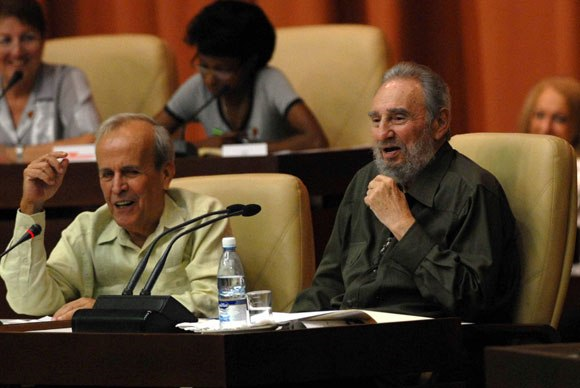
Racial Gap Deepens in the United States
- English
- Español
Racial Gap Deepens in the United States

By Manuel E. Yepe
http://manuelyepe.wordpress.com/
Exclusive for daily POR ESTO! of Mérida, México.
A CubaNews translation.
Edited by Walter Lippmann.
Race relations have worsened in the United States since Donald Trump’s electoral campaign began. With his recent confirmation as the Republican presidential candidate, this deterioration appears to have reached a critical state.
Upon accepting the presidential nomination at the National Republican Convention in Cleveland, Trump described himself as the “law-and-order candidate”, and declared he was ready to restore in the country a security “that is out of control and needs a leader” capable of implementing sharp measures to protect Americans.
“The first task of my new administration will be to relieve our citizens from the crime, terrorism and anarchy that threaten their communities,” he said.” I have a message for every person who threatens peace in our streets and the safety of our police: when I take office next year: I will restore law and order in our country”.
Appealing to the anguish of the voters who feel that the rest of the world no longer respects the United States, Trump pledged to act quickly so that Americans feel better about the sad image their country projects. He promised to warn allies and enemies that Washington would focus exclusively on protecting US’s own interests.
Without softening his tone, or departing from the hardline that has characterized his campaign, Trump described Americans as victims of immigrants, international companies and irresponsible leaders. He presented himself as the defender of the “forgotten men and women in our country”.
By explicitly affirming white identity and voicing the most widespread complaints, Trump has galvanized the marginal world of white nationalists who describe themselves as “racial realists”. They hail him as the man who has helped millions of white Americans to understand that race should matter to them as much as to everyone else.
The pro-Trump activists say he has freed Americans to say what they really think. A survey conducted by CBS News in April showed that half of those surveyed admitted there is a problem and more than 60% considered that race relations had worsened.
More recently, an investigation conducted nationally by the Pew Research Center of Washington, DC (PEW) between June 5 and July 7, involving 4,602 adults, showed that black and white Americans have profoundly different views on racial equality, and they also differ on the extent to which a person’s race can be a burden or a benefit.
For blacks, the answer is clear: 65% say “it is a lot more difficult to be black in this country than it is to be white.”
Fewer than half as many whites (27%) agree. The racial gap in perception of white advantages is even starker: 62% of blacks say “white people benefit a great deal from advantages in society that black people do not have.” Just 13% of whites say whites have benefited a great deal from advantages that blacks lack.
Commenting on the evidence of this study on perception of race advantages or disadvantages, PEW researcher Shiva Maniam wrote on July 18 that among Latinos, 37% say it is lot more difficult to be black than white, which is higher than the share of whites who say this but far lower than the number of blacks who do so.
Most Latinos say white people benefit from advantages in society that blacks do not have; 33% say whites benefit a great deal from these circumstances, compared with 62% of blacks and 13% of whites.
About the perception of how blacks are treated in different areas, another recent survey revealed that most blacks believe they are treated less fairly than whites in dealing with the police, in the courts, when applying for a loan or mortgage, and in the workplace. At least four out of ten interviewed said that blacks receive much worse treatment in stores and restaurants and when voting in elections.
July 22, 2016.
SE AHONDA LA BRECHA RACIAL EN EE.UU.

Por Manuel E. Yepe
http://manuelyepe.wordpress.com/
Exclusivo para el diario POR ESTO! de Mérida, México.
Las relaciones raciales han empeorado en Estados Unidos desde quecomenzó la campaña electoral de Donald Trump y con su recienteconfirmación como candidato republicano a la presidencia de lanación este deterioro parece haber alcanzado un estado crítico.
Al aceptar en Cleveland la nominación presidencial en la ConvenciónNacional Republicana, Trump se describió a sí mismo como el “candidatode la ley y el orden” y se declaró dispuesto a restaurar la seguridaddel país, “que está fuera de control y necesita un líder” capaz deimplementar medidas tajantes para proteger a los estadounidenses.“La primera tarea de mi nueva administración será liberar a nuestrosciudadanos de la delincuencia, el terrorismo y la anarquía queamenazan a sus comunidades”, dijo.
“Tengo un mensaje para cada persona que amenaza la paz en nuestrascalles y la seguridad de nuestros policías: cuando tome posesión delcargo el próximo año, voy a restaurar la ley y el orden en nuestropaís”.
Apelando a la angustia de los votantes que sienten que el resto delmundo ya no respeta a Estados Unidos, Trump se comprometió a actuarcon rapidez para que los estadounidenses se sientan mejor sobre latriste imagen que proyecta su país y prometió que advertirá a aliadosy enemigos que Washington en lo adelante se centrará exclusivamente enla protección de sus propios intereses.
Sin suavizar su tono ni apartarse de la línea dura que hacaracterizado su campaña, Trump describió a los estadounidenses comovíctimas de los inmigrantes, las empresas internacionales y loslíderes irresponsables, y se presentó como el defensor de los “hombresy mujeres olvidados de nuestro país”.
Al afirmar de manera explícita la identidad blanca y hacerse eco delas quejas más generalizadas, Trump ha galvanizado el mundo marginalde quienes se declaran nacionalistas blancos y se describen a símismos como “realistas raciales”.
Ellos lo aclaman como el hombre que ha logrado que millones deestadounidenses blancos entiendan que la raza les debe importar tantocomo a todos los demás. Los activistas pro-Trump dicen que él haliberado a los estadounidenses para que digan lo que realmentepiensan.
En una encuesta realizada en abril por la cadena CBS News, casi lamitad de los consultados admitió esa problemática y más del 60 %consideró que las relaciones raciales empeoraban.
Más recientemente, en una pesquisa llevada a cabo a nivel nacional porel Centro Pew de Investigaciones, de Washington, DC (PEW) entre el 5de junio y el 7 de julio con participación de 4.602 adultos, se pusode manifiesto que los estadounidenses blancos y negros tienen puntosde vista sumamente diferentes acerca de la igualdad racial y quetambién difieren en cuanto a la medida en que la raza de una personapuede serle una carga o un beneficio.
Para los negros, la respuesta es clara. El 65% dice que en EstadosUnidos “es mucho más difícil ser negro que ser blanco”. Solo el 27% delos blancos coincide en este aserto.
La brecha racial en la percepción de las ventajas del blanco sobre elnegro es también significativa. El 62% de los encuestados negrossostiene que “la gente blanca se beneficia de muchas ventajas que lesofrece la sociedad que no tienen los negros”. Sólo el 13% de losblancos admite que los de su raza se beneficien mucho de ventajas delas que carecen los negros.
Comentando las evidencias de esta investigación sobre quienes sonayudados o perjudicados por su raza, Shiva Maniam, investigadorasistente de PEW escribió el 18 de julio que entre los hispanos, 37%señala que es mucho más difícil ser negro que ser blanco, pero essuperior la proporción de blancos que así piensan y mucho menor elnúmero de negros que lo hacen. La mayoría de los hispanos apunta quelos blancos se benefician de ventajas en la sociedad que los negros notienen; 33% dice que los blancos se benefician mucho de estascircunstancias, proporción que se eleva al 62% de los negros y un 13%de los blancos a nivel de la nación.
Acerca de la percepción de cómo son tratados los negros en diferentesáreas, otra encuesta reciente reveló que la mayoría de los negrosafirma que recibe un trato menos justo que los blancos en su relacióncon la policía, en los tribunales, al solicitar un préstamo o unahipoteca y en su centro de trabajo. Por lo menos cuatro de cada diezentrevistados dijeron que los negros reciben un trato bastante peor entiendas o restaurantes, así como al votar en las elecciones.
Julio 22 de 2016.
Colombia: In the Final Stage Before Peace
- English
- Español
Colombia: In the Final Stage Before Peace

By Manuel E. Yepe
http://manuelyepe.wordpress.com/
Exclusive for daily Por Esto! Merida, Mexico.
A CubaNews translation.
Edited by Walter Lippmann.
In any conflict between two, it is logical that the conclusion should produce a winner and a loser. Only three forms of postwar peace have always existed: the one imposed by the victor, humiliating for the vanquished; Pyrrhic peace in which to reach victory the winner has suffered many or more losses than the defeated; and peace determined by the inability of either party to achieve success after extreme suffering for both sides. The latter is the one that seems closer to become a reality in Colombia.
All humanity has received with joy the promise of peace in Colombia that was sealed with the agreements on ceasefire, deposition of weapons, security guarantees and other aspects signed on June 23 in Havana by the President of Colombia, Juan Manuel Santos, and Commander Timoleon Jimenez, Chief of Staff of the Colombian FARC-EP.
The senior leader of the guerrilla organization was adamant in his speech at the document signing ceremony saying that “neither the FARC nor the Colombian State are defeated forces and therefore the agreement cannot be understood by anyone as a result of any imposition of one party to the other.
“We have discussed at length and even got to alleys that seemed to be dead-ends. These could only be overcome thanks to the generous and effective intervention of the guarantor countries, Cuba and Norway, and the opportunities and wise formulas suggested by the creativity of the spokespersons of both parties and their diligent advisers,” Jimenez said.
The armed conflict has already surpassed in its duration – more than half a century– than any other of this nature in the world. The FARC, that on 27 May last reached 52 years of existence, constitutes the largest and most representative guerrilla resistance organization in Colombia. Therefore this approach to peace has the virtual significance of an approach to the end of the war.
“It is true that there subsist other phenomena of violence and crime, as the ELN and criminal gangs linked to drug trafficking. But something we all need to understand is that this agreement reached with the FARC means ending the war with the largest and oldest guerrilla organization. This has a huge importance for the present and the future of Colombia,” said at the signature ceremony Colombian President Juan Manuel Santos.
This coming November 19 will mark four years since the start of the talks between the Colombian government and the FARC-EP in Havana. These talks had the difficult and ambitious task of bringing together two sides that have been in combat for over half a century.
Hardly anyone of good will doubted then that Cuba was the ideal setting for the meeting, given Havana’s well-earned diplomatic prestige as well as considering its history of courageous respect for the parties in dispute for the sake of solving several serious conflicts. This behavior led Pope Francisco to predict that Cuba could become the capital of world unity.
At the signing ceremony for the agreements, President Santos recalled that there are still important issues to agree on so that the final agreement could be signed in Colombia as soon as possible.
There have been critics of the talks who, among other deceptions, have tried to show that the FARC sought, through this process, to make politics while holding on to weapons.
On this issue, Commander Timoleon Jimenez, the revolutionary leader heading the signing guerrilla delegation, , stressed: “Of course the FARC makes politics, that is our reason for being, but we will make it by legal and peaceful means, with the same rights and guarantees as other parties.”
Meanwhile, the Colombian government will have to guarantee that no Colombian is persecuted for their ideas or political practices, and that once the final agreement is signed, the military war machine and the antiquated security doctrine will disappear.
At the solemn ceremony of signing the agreements, the revolutionary chief called the Colombian armed forces – which massively grew in the course of the war and were trained in counterinsurgency and special operations– to henceforth play an important role in the interest of peace, reconciliation and the country’s actions for development. “They were our opponents, but in the future we will have to be allied forces for the good of Colombia”.
July 2, 2016.
COLOMBIA EN LA RECTA FINAL POR LA PAZ

Por Manuel E. Yepe
http://manuelyepe.wordpress.com/
Exclusivo para el diario POR ESTO! de Mérida, México.
En cualquier conflicto entre dos, lo lógico es que la conclusión produzca un vencedor y un vencido. Solamente tres formas de paz en las posguerras deben haber existido siempre: la impuesta por el vencedor, humillante para el vencido; la paz pírrica en la que el triunfador ha sufrido tantos o más quebrantos que el derrotado para alcanzar la victoria, y la paz determinada por la imposibilidad de que alguna de las partes logre el éxito luego de extremos sufrimientos por ambos contendientes. Esta última es la que parece próxima a hacerse realidad en Colombia.
La humanidad toda ha recibido con júbilo la promesa de paz en Colombia que se selló con los acuerdos sobre cese al fuego, dejación de las armas, garantías de seguridad y otros aspectos suscritos el reciente 23 de junio en La Habana por el Presidente de Colombia, Juan Manuel Santos, y el Comandante Timoleón Jiménez, Jefe del Estado Mayor Central de las Fuerzas Armadas Revolucionarias-Ejército del Pueblo del propio país sudamericano.
El alto dirigente de la organización guerrillera fue categórico al afirmar en su discurso en la ceremonia de firma de los documentos que “ni las FARC ni el Estado colombiano son fuerzas vencidas y por ende lo pactado no puede entenderse por nadie como producto de alguna imposición de una de las partes a la otra. Largamente hemos discutido e incluso llegamos a callejones que parecían sin salida, que solo pudieron superarse gracias a la desinteresada y eficaz intervención de los países garantes, Cuba y Noruega, y las oportunidades y sabias fórmulas sugeridas por la creatividad de los voceros de ambas partes o sus acuciosos asesores”.
El conflicto armado ya ha superado por su duración de más de medio siglo a cualquiera otro de este carácter en el mundo. Las FARC, que el 27 de mayo último cumplieron 52 años de existencia, constituyen la mayor y más representativa organización de la resistencia guerrillera en Colombia, de ahí que esta aproximación a la paz tenga la
significación virtual de un acercamiento al final de la guerra. “Es cierto que subsisten otros fenómenos de violencia y delincuencia, como el ELN y las bandas criminales asociadas al narcotráfico. Pero algo que todos debemos comprender es que este acuerdo logrado con las FARC significa terminar la guerra con la organización guerrillera más grande y más antigua y tiene una importancia inmensa, inmensa para el presente y el futuro de Colombia”, declaró en el acto de la firma el Presidente colombiano Juan Manuel Santos.
El próximo 19 de noviembre se cumplirán cuatro años de la
constitución de la mesa de conversaciones entre el gobierno de Colombia y las FARC-EP en La Habana con la escabrosa y ambiciosa encomienda de acercar las dos partes en combate por más de medio siglo.
Casi nadie, de buena fe, puso en duda entonces que Cuba fuese el escenario idóneo para el encuentro, dado el bien ganado prestigio de la diplomacia de La Habana por su historial de valiente respeto a las partes en disputa en aras de la solución de diversos graves
conflictos, comportamiento que llevó al Papa Francisco a predecir que Cuba pudiera convertirse en la capital de la unidad mundial. En la ceremonia de firma de los acuerdos, el Presidente Santos recordó que aún quedan temas importantes por acordar para que el acuerdo final pueda ser suscrito en Colombia lo antes posible.
No han faltado detractores de las conversaciones quienes, entre otros engaños han pretendido hacer ver que las FARC buscaban, con este proceso, hacer política sin dejar las armas.
A ello se refirió el jefe de la delegación guerrillera firmante, Comandante Timoleón Jiménez, cuando puntualizó: “Claro que las FARC haremos política, esa es nuestra razón de ser, pero la haremos por medios legales y pacíficos, con los mismos derechos y garantías de los demás partidos”, puntualizó el líder revolucionario.
Por su parte, el Estado colombiano tendrá que hacer efectivo que a ningún colombiano se le persiga por razones de sus ideas o prácticas políticas y que una vez que sea firmado el acuerdo final desaparezca el dispositivo militar de guerra y su anticuada doctrina de seguridad. En la solemne ceremonia de la firma de los acuerdos el jefe
revolucionario llamó a que las fuerzas armadas colombianas, que fueron agigantadas en el transcurso de la guerra y adiestradas en
contrainsurgencia y acciones especiales a que, en lo adelante jueguen un importante papel en aras de la paz, la reconciliación y el desarrollo del país. “Ellas fueron nuestras adversarias pero en lo adelante tendremos que ser fuerzas aliadas por el bien de Colombia”.
Julio 2 de 2016.
Marxists Say Clinton is Not the Lesser Evil
- English
- Español
Marxists Say Clinton is Not the Lesser Evil

By Manuel E. Yepe
http://manuelyepe.wordpress.com/
Exclusive for journal POR ESTO! of Mérida, México.
A CubaNews translation.
Edited by Walter Lippmann.
“By rejecting Hillary Clinton as Lesser Evil and, most importantly, by resolving to build political independence, Sanders campaign activists and supporters can make 2016 a year of genuine “political revolution.” This is the conclusion reached in an article published by Marxism Leninism Today (MLT) on July 12.
Under the title “What Should Bernie Sanders Supporters Do Now?” the editors express their view on the decision of Senator Sanders to join the Hillary Clinton campaign –against whom he had sought the nomination of the Democratic Party– and consider that the 2016 elections reflect the deepening crisis of the capitalist economic system in general and the US political party system in particular.
In the 2016 primary season, something new happened: voter response to Trump and Sanders represented a new level of mass disaffection from the existing political system.
“Everyone knew voter anger had to come, sooner or later. Forty years of stagnant or declining wages, the export of jobs and de-industrialization, growing inequality, police violence against Black youth, mass incarceration, attacks on unions and labor rights, rolling back the social safety net, endless wars, the 2008 Great Recession and the halting recovery, gridlock in Congress, growing poverty and insecurity – all have altered the consciousness of tens of millions,” said MLT.
“At the Democratic Party Platform drafting meeting in Orlando, Florida, Sanders’ positions on issues such as the Trans-Pacific Partnership, Palestinian rights, and single-payer healthcare have been rebuffed by the Clintonites,” the US communists journal said.
Worsening social discontent sparked insurgencies in both major parties. With the narrowing differences between the two monopoly parties, the received wisdom, “Vote for Lesser Evil” makes less and less sense to ordinary voters, let alone to Sanders supporters.
Voter anger has finally found political expression at the ballot box, but the way anger has been expressed is not symmetric.
In the case of the Democrats, Bernie Sanders offered a version of Scandinavian social democracy. Political independence was no part of his plan. From the start, he pledged to support the eventual Democratic nominee. To his credit, he moved leftward on a number of important issues. His campaign inspired sections of the Democratic base, especially youth. Sanders wound up with 12 million votes in the primaries, compared to 16 million for Clinton.
According to MLT’s article, progressive/liberal insurgencies in the Democratic Party are not new: Ted Kennedy against Jimmy Carter in 1980; Jesse Jackson in 1984 and 1988; Howard Dean in 2004; Dennis Kucinich in 2004 and 2008. In all cases, the insurgency petered out. Most Democrats ended up voting for the Democratic nominee, seemingly a “Lesser Evil”, rather than a thoroughly-reactionary Republican candidate. The Democratic Party establishment knows how to corral stray sheep.
The Clinton camp, for example, has done this with talk of Trump’s “fascism” or his “McCarthyism,” or the unspeakable horror of “losing” the US Supreme Court.
The Lesser Evil argument has never been weaker than it is now, says MLT, “The two big parties are equally evil; then it is incumbent on progressives to begin systematic political work for independence from the two-party system. Trump and Clinton are equally evil, but in different ways. On domestic issues (except trade), Trump is obviously worse than Clinton, but on foreign policy Clinton is demonstrably more dangerous than Trump,” affirms MLT.
Trump represents a long US tradition of right-wing populism that mingles racism, xenophobia, nationalism, and isolationism with nostalgia for a golden past. He combines attacks on socially-oppressed groups with distorted forms of anti-elitism based on “scapegoating”.
July 19, 2016.
DICEN MARXISTAS QUE CLINTON NO ES MAL MENOR

Por Manuel E. Yepe
http://manuelyepe.wordpress.com/
“Rechazando que Hillary Clinton sea un mal menor y, lo más importante, estando resueltos a construir su independencia política, los activistas y partidarios de la campaña de Sanders pueden hacer de 2016 un año de genuina revolución política”, dice un comentario de Marxismo Leninismo Hoy (MLT)” publicado el 12 de julio.
Con título “¿Qué deben hacer ahora los partidarios de Bernie Sanders?”, expresan el criterio de la dirección de su formación política acerca de la decisión del senador Sanders de sumarse a la campaña de Hillary Clinton, con quien contendía por la candidatura del partido demócrata, al tiempo que evalúan las elecciones de 2016 como un reflejo del agravamiento de la crisis del sistema capitalista en general y del sistema de partidos políticos de Estados Unidos en particular.
En la temporada de primarias de 2016, sucedió algo novedoso: las candidaturas de Trump y Sanders demostraron la existencia de un nuevo nivel de malquerencia en el sistema político vigente.
“Todos sabían que la ira de los votantes tendría que aparecer tarde o temprano. Cuarenta años de estancamiento o disminución de los salarios; de desindustrialización y exportación de puestos de trabajo, de crecientes desigualdades, de violencia policial contra jóvenes negros, encarcelaciones masivas y ataques contra los sindicatos obreros y los derechos laborales, de retrocesos en la red de seguridad social, de guerras interminables, de la Gran Recesión de 2008 y su vacilante recuperación; paralizaciones en el Congreso; creciente pobreza e inseguridad -todo lo cual concientiza a decenas de millones”, expone MLT.
En una reunión para la redacción de la plataforma del partido demócrata que se efectuó en Orlando, Florida, las posiciones de Sanders en temas como el acuerdo de Asociación Transpacífico, los derechos de los palestinos y el pagador único de salud fueron rechazados por los clintonitas, recuerda el texto de los comunistas estadounidenses.
El agravamiento del descontento social provocó insurgencias en ambos partidos mayoritarios. Con el estrechamiento de las diferencias entre las dos partes del monopolio, el “Voto por el mal menor” tiene cada vez menos sentido para los votantes comunes y corrientes, y mucho menos para los seguidores de Sanders.
La irritación de los votantes, finalmente, ha tenido expresión política en las urnas, pero ésta se ha expresado de manera asimétrica. En el caso de los demócratas, Bernie Sanders ofreció una versión de la socialdemocracia escandinava de la que no era parte la independencia política de los dos grandes partidos. Desde el primer momento prometió apoyar al candidato demócrata vencedor en las primarias. Tuvo a su favor el haber movido hacia la izquierda la agenda demócrata en varias cuestiones importantes. Su campaña inspiró a muchos sectores de la base demócrata, especialmente a los jóvenes. Obtuvo 12 millones de votos en las primarias, que se comparan con 16 millones de Clinton.
Según el artículo de MLT, las insurgencias progresistas o liberales en el partido demócrata no son nuevas: Ted Kennedy contra Jimmy Carter en 1980; Jesse Jackson en 1984 y 1988; Howard Dean en 2004; Dennis Kucinich en 2004 y 2008. La mayoría terminaron votando por el candidato demócrata, aparentemente porque eran un “mal menor” que el candidato republicano declaradamente reaccionario.
La dirigencia del partido demócrata sabe cómo hacer volver al redil de la oveja perdida.
En el caso de Clinton, por ejemplo, lo ha hecho aludiendo al “fascismo” o el “macartismo” de Trump, o al horror indecible de “perder” la Corte Suprema de los Estados Unidos.
El argumento del mal menor nunca ha sido más débil que ahora, asegura MLT. “Los dos grandes partidos son igualmente malos, corresponde por ello a los progresistas comenzar un trabajo político sistemático por su independencia del sistema de dos partidos. Trump y Clinton son igualmente malos. En asuntos internos (excepto comercio), Trump es evidentemente peor que Clinton, pero en política exterior Clinton se muestra más peligrosa que Trump, afirma MLT.
Trump representa una larga tradición estadounidense de populismo de derecha que mezcla racismo, xenofobia, nacionalismo y aislacionismo con nostalgia de un pasado dorado. Combina ataques a grupos socialmente oprimidos con formas distorsionadas de anti elitismo basado en la búsqueda de chivos expiatorios.
En el caso de los demócratas, Bernie Sanders ofreció una versión de la socialdemocracia escandinava sin que fuera parte de su plan la independencia política. Prometió siempre apoyar al candidato demócrata vencedor en las primarias. En su favor está haber movido hacia la izquierda la agenda demócrata en una serie de cuestiones importantes.
Julio 19 de 2016.
The Best Thing About Brexit is the Resulting Chaos
- English
- Español
The Best Thing About Brexit is the Resulting Chaos

By Manuel E. Yepe
http://manuelyepe.wordpress.com/
A CubaNews translation.
Edited by Walter Lippmann.
Exclusive for journal POR ESTO! of Mérida, México.
“No one in the British or American establishment foresaw the “Brexit” vote that called for a United Kingdom withdrawal from the European Union. The world has to be thankful for hubris and political miscalculation,” wrote journalist Margaret Kimberley, on July 1st, in her column Freedom Rider for the Black Agenda Report.
If there had been any inkling of a Brexit victory, Prime Minister David Cameron would never have agreed to put the matter to a vote.
“Despite its well-cultivated image of progress and enlightenment, the European Union is not a bulwark of peace and international cooperation. It acts as America’s 28-nation gang of enforcers, at the service of US foreign policy. But the countries that make it up are also victims of US power. The United States is the European Union’s invisible senior partner making sure that it keeps the international ‘banksters’ well-funded, expands NATO and makes certain that no one steps out of the US orbit.”
Under American pressure, the EU expanded its membership to include poorer countries whose people then had the right to immigrate to more prosperous countries like the UK. This race to the bottom for workers was not just the concern of xenophobes and racists but of people whose living wage jobs decrease or disappear.
In one of his worst acts of desperation, Cameron invoked the spirit of the much-maligned Vladimir Putin, declaring that a Brexit vote would only benefit the man turned into a villain by Western politicians and media.
The warnings of economic catastrophe were ignored in favor of a desire for freedom from a cooked-up union that exists to make capital flow more easily. It is true that the most visible Brexit campaigners were motivated by anti-immigrant sentiment. But the Labor Party is also under the sway of finance capital and the discredited specter of the criminal Tony Blair.
The media reaction to the vote is proof of how much the establishment wants to stay within the bounds of the neo-liberal project. “Voters who chose the Brexit route have been labeled as stupid, and we are told that 17 million people didn’t know what they were doing”, wrote Kimberley. Every instance of hate speech and hate crime is now blamed on the Brexit vote, as if there was an absence of racism and intolerance before.
Cameron will step down, but there is turmoil in the Labour Party, too. Scotland voted to stay, and its leadership has already said that the referendum will not be binding upon them. There is talk of a second referendum, which makes a mockery of the constant shrieking about democracy in the capitalist world.
Other nations are watching and people in the rest of Europe are making the case for once again having their own currencies and leaving NATO behind. “They want freedom from the big bullies in the school yard, the United States of America and finance capital,” said Margaret Kimberley.
Ordinary people may not be able to articulate their discomfort, but they’ll speak up when given the opportunity to express their unhappiness. Some who voted to leave the EU may be well-versed on the subject, some were anti-immigrant, others were fed up with politicians who lie to them about wars or austerity.
The end result of Brexit may be the end of the United Kingdom. Scotland and Northern Ireland voted to remain in the EU while England and Wales voted to leave. Given another opportunity, the Scottish people may choose independence.
Britain has committed some of the worst criminal acts in history, ranging from slavery to colonialism. Now it acts in concert with the United States to sanction and threaten. For now it is unlikely to play a major role in provoking Russia, which has suddenly moved down on the imperialist to-do list.
Chaos can be a good thing. The current mess of post-Brexit politics is a sign that one part of the capitalist coalition is in trouble. It will not be easy to go back and negate the will of the people. This earthquake can’t be papered over easily and that is a good thing indeed.
The post-referendum recrimination and political chaos benefit humanity. The latest trade deal monstrosity, the Trans Atlantic Trade and Investment Partnership (TTIP), is on hold for now and NATO provocations against Russia will take a back seat. Millions of people will get a respite from the US meddling in their lives,” concludes Margaret Kimberley.
July 12, 2016
EL CAOS PROVOCADO ES LO MEJOR DEL BREXIT

Por Manuel E. Yepe
http://manuelyepe.wordpress.com/
“Nadie en Gran Bretaña o Estados Unidos previó la votación de “Brexit” que llamaba al retiro del Reino Unido de la Unión Europea. El mundo tiene que estar agradecido por la arrogancia y el error de este cálculo político”, escribió el 1º de julio la periodista Margaret Kimberley en su columna Freedom Rider de Black Agenda Report. Si hubiera habido siquiera un mínimo indicio de una probable victoria de Brexit, el primer ministro David Cameron jamás habría aprobado llevar el asunto a votación.
“Pese a su bien cultivada imagen de progreso e ilustración, la Unión Europea no es un baluarte de paz y cooperación mundial. Actúa como una banda de 28 naciones al servicio de la política exterior de Estados Unidos pero los países que la integran también son víctimas del poder norteamericano. Estados Unidos es el socio invisible de la UE, asegurando que se mantenga bien financiada, crezca la OTAN y nadie se salga fuera de la órbita estadounidense”.
Bajo presión estadounidense, la UE ha ampliado su membrecía para incluir a los países más pobres cuyos pueblos tenían entonces motivos para emigrar a países más prósperos como el Reino Unido. De modo que este problema no era solo para los trabajadores ni era sólo
preocupación de xenófobos y racistas sino también de aquellos cuyos empleos y salario desaparecen o decrecen.
En uno de sus peores actos de desesperación, Cameron invocó el espíritu del muy calumniado Vladimir Putin y declaró que un voto a favor de Brexit sólo beneficiaría al hombre convertido en un villano por los medios de comunicación y políticos occidentales.
Fueron ignoradas las advertencias de catástrofe económica a favor de un deseo de libertad de una Unión nacida de la necesidad de hacer más fácil el flujo de capital. Es cierto que activistas muy señalados del Brexit estaban motivados por el sentimiento anti-inmigrante. Pero, también los había en el partido laborista bajo la influencia del capital financiero y el fantasma desacreditado del criminal Tony Blair.
La reacción de los medios de comunicación a la votación fue prueba de cuánto el “establishment” deseaba permanecer dentro del proyecto neoliberal. “Los votantes que eligieron la ruta del Brexit han sido etiquetados como estúpidos, y se nos dice que 17 millones de ciudadanos no sabían lo que estaban haciendo”, dice Kimberley. Por cada acto o discurso vinculado a un crimen de odio se culpa ahora a la votación de Brexit, como si hubiera existido una ausencia total de racismo e intolerancia anteriormente.
Cameron se retirará, pero también deja gran confusión en el partido laborista. Escocia votó por quedarse, pero sus líderes ya han dicho que el referéndum no será vinculante para ellos. Se habla de un segundo referéndum, que constituiría una burla a los constantes alardes de democracia en el mundo capitalista.
Otros países están observando y mucha gente en el resto de Europa ha comenzado a hablar una vez más de tener sus propias monedas y de dejar la OTAN. “Quieren liberarse de los grandes matones en el patio de la escuela: los Estados Unidos de América y el capital financiero”, afirma Margaret Kimberley.
La ciudadanía no es capaz de articular sus razones pero habla, cuando le dan la oportunidad, de su infelicidad. Algunos de los que votaron por abandonar la UE pueden ser versados sobre el tema, los hay que votaron contra los inmigrantes, otros porque estaban hartos de los políticos que les mienten sobre guerras y austeridad.
El resultado final de Brexit pudiera ser el fin del Reino Unido. Escocia e Irlanda del norte votaron a favor de permanecer en la UE mientras que Inglaterra y Gales votaron para salir. Dada otra oportunidad, los escoceses pueden elegir la independencia.
Gran Bretaña cometió algunos de los peores actos criminales en la historia de la esclavitud y el colonialismo. Ahora actúa en concierto con Estados Unidos, sancionando y amenazando. Por ahora es poco probable que juegue un papel muy importante en provocar a Rusia, que de pronto ha bajado en la lista de prioridades imperialista. El caos puede ser una buena cosa. El desorden actual de la política post-Brexit es un signo de que una parte de la coalición capitalista está en problemas. No se podrá dar para atrás fácilmente y negar la voluntad de la gente. Este terremoto no se puede recubrir fácilmente y eso es, de hecho, una buena cosa.
Los reproches posteriores al referéndum y el caos político resultante benefician a la humanidad. La reciente monstruosidad de la Sociedad Transatlántica sobre Comercio e Inversión (TTIP), ha quedado por ahora en suspenso y las provocaciones de la OTAN contra Rusia han perdido prioridad. Millones de personas tendrán un respiro en lo que concierne a la intromisión de Estados Unidos en sus vidas, dice Margaret Kimberley.
Julio 12 de 2016.
The Sociopathic Founder of the United States
- English
- Español
The Sociopathic Founder of the United States

By Manuel E. Yepe
http://manuelyepe.wordpress.com/
Exclusive for the daily POR ESTO! of Mérida, México.
A CubaNews translation.
Edited by Walter Lippmann.
Two years ago journalist Robert Parry published his article on the debate between Thomas Jefferson and Alexander Hamilton during the early years of the existence of the United States of America. The balance of the contention between these two important figures of American history was very favorable to Jefferson. But the recent success on Broadway of the musical “Hamilton” has reopened the understanding of the facts by showing aspects of the dark side of Jefferson which had not been widely known.
One of the Founding Fathers of the United States, and main author of the Declaration of Independence (1776), Jefferson was elected second vice president of the United States (1797-1801) under President John Adams, and in 1800, became the third president of the country.
Although Jefferson owned numerous plantations where hundreds of slaves worked, he is considered a promoter of democracy, republicanism and individual rights, factors that motivated North American settlers to break up with Britain and create the new nation.
As a rule on July Fourth, anniversary of the Declaration of Independence and a national holiday in the United States, expressions on human rights in the Declaration of Independence are widely quoted, especially the noble phrase “all men are created equal” penned by Thomas Jefferson.
“But Jefferson really didn’t believe that or much else he said and wrote during his lifetime. He was, in reality, a skilled propagandist and a world-class hypocrite,” journalist Robert Parry clarifies in an article recently printed on July 4th by the Consortium News website.
“Yet, rather than subject Jefferson to a rigorous examination for his multiple hypocrisies, many Americans insist on protecting Jefferson’s reputation. From the Left, there is a desire to shield the lofty principles contained in the Declaration. From the Right, there is value in pretending that Jefferson’s revisionist concept of the Constitution, one favoring states’ rights over the federal government was the “originalist” view of that founding document.”
Despite the Constitution’s explicit reference to making federal law “the supreme law of the land,” Jefferson exploited lingering resentments over ratification to reassert the states’ supremacy over the federal government. Often working behind the scenes, even while serving as Vice President under President John Adams, Jefferson promoted each state’s right to nullify federal law.
“So, Jefferson, perhaps more than any figure in U.S. history, gets a pass for what he really was: a self-absorbed aristocrat who had one set of principles for himself and another for everybody else,” Parry wrote.
Beyond the glaring contradiction between his “all men are created equal” pronouncement and his racist views on African-American slaves, he also lectured others about the need for frugality and the avoidance of debt while he lived a life of personal extravagance and was constantly in arrears to creditors.
According to Parry, more evidence of Jefferson’s ambivalence is his famous phrase, “The tree of liberty must be refreshed from time to time with the blood of patriots and tyrants. It is its natural manure.” That is one of Jefferson’s famous quotes repeated endlessly these days by both the right-wing Tea Party and would-be leftist revolutionaries.
“But Jefferson’s bravado was more a rhetorical flourish than a principle that he was ready to live or die by. In 1781, when he had a chance to put his own blood where his mouth was, when a Loyalist force led by the infamous traitor Benedict Arnold advanced on Richmond, Virginia, then-Gov. Jefferson fled for his life on the fastest horse he could find,” Parry wrote.
Nevertheless, Jefferson later built his political career by questioning the revolutionary commitment of Alexander Hamilton and even George Washington, who repeatedly did risk their lives in fighting for American liberty.
But what Jefferson’s many apologists have most desperately tried to obscure was his wretched record on race. Parry illustrates this with many stories about his personal, family and social life.
“As unpleasant as it may be for Americans who prefer, especially on July Fourth, to ponder the pleasant image of Jefferson as the aristocratic republican with a taste for fine art and a fondness for free-thinking, it is well past time to look at the Declaration’s author as the person he really was, America’s founding sociopath,” Parry concludes.
July 8, 2016.
Spanish Headline Here

Por Manuel E. Yepe
http://manuelyepe.wordpress.com/
Cuando hace dos años fue publicado un artículo del periodista Robert Parry sobre el debate entre Thomas Jefferson y Alexander Hamilton en los años iniciales de la existencia de los Estados Unidos de América, el saldo de la porfía entre esas dos importantes figuras de la historia norteamericana fue muy favorable a Jefferson. Pero el reciente gran éxito en Broadway del espectáculo musical “Hamilton” ha reabierto el entendimiento de los hechos, mostrando facetas poco difundidas sobre el lado oscuro de Jefferson.
Uno de los Padres Fundadores de Estados Unidos y principal autor de la Declaracion de Independencia (1776) de esa nación, Jefferson fue electo segundo vicepresidente de Estados Unidos (1797-1801) bajo el presidente John Adams y, en 1800, devino el tercer presidente del país.
Aunque Jefferson poseía numerosas plantaciones en las que laboraban cientos de esclavos, se le considera promotor de la democracia, el republicanismo y los derechos individuales, factores que motivaron a los colonos llegados a Nortemérica a romper con Gran Bretaña y crear la nueva nación.
Como es regla, el 4 de julio, aniversario de la proclamación de la independencia y fiesta nacional de los Estados Unidos, son muy difundidas las citas sobre los derechos humanos incertadas por Jefferson en la declaración de la independencia, en especial la frase que reza “todos los hombres son iguales.”
“Pero en realidad Jefferson no creía mucho en eso ni en otras muchas cosas que dijo y escribió durante toda su vida. El era, en realidad, un experto propagandista y un hipócrita de primera clase”, esclarece el periodista Robert Parry, en un artículo que publicó el reciente 4 de julio la revista Consortium News.
“Sin embargo, en lugar de proceder a un examen riguroso de las hipocresías de Jefferson, muchos estadounidenses insisten en salvaguardar su reputación. Desde la izquierda, para proteger los nobles principios contenidos en la declaración. A la derecha, por interés en subrayar los conceptos revisionistas de Jefferson insertos en la Constitución, en particular los que favorecen los derechos estaduales sobre las facultades del gobierno federal que él
consideraba nociones “originales” del documento fundacional. No obstante la referencia explícita en la Constitución que hace de la ley federal de “la Ley Suprema de la tierra”, Jefferson explota el sentimiento persistente en relación con la supremacía de los estados. A menudo trabajando detrás del telón, incluso cuando se desempeñaba como Vice Presidente en el gobierno del Presidente John Adams, Jefferson promovió el derecho de cada estado a anular la ley federal. Así, Jefferson, quizás más que cualquier otra figura en la historia de Estados Unidos, clasifica como lo que realmente fue: un aristócrata absorto en sí mismo que tenía un conjunto de principios para él y otro para todo el mundo, según Parry.
Más allá de la flagrante contradicción entre su pronunciamiento de que “todos los hombres son creados iguales” y sus puntos de vista racistas acerca de los esclavos afroamericanos, también está el hecho de profesaba para los demás la frugalidad y la evitación de deudas en tanto que él vivió una vida de extravagancia personal, siempre en mora con los acreedores.
Otra prueba de esta ambivalencia, según Parry, es su famosa frase de que “el árbol de la libertad debe actualizarse de vez en cuando con la sangre de patriotas y tiranos, que es su abono natural”. Ésta, una de las frases famosas de Jefferson, sirve por igual al derechista Tea Party y a izquierdistas aspirantes a ser revolucionarios.
Pero la bravuconería de Jefferson era más floreo retórico que principios por los que estuviera dispuesto a morir. En 1781, tuvo oportunidad de exponer su propia sangre en defensa de lo que proclamaba cuando una fuerza leal dirigida por un traidor avanzó sobre Richmond, Virginia, estado del que él era entonces gobernador y Jefferson optó por huir para salvar su vida en el caballo más rápido que pudo encontrar, asevera Parry.
Sin embargo, Jefferson más tarde construyó su carrera política cuestionando el compromiso revolucionario de Alexander Hamilton y hasta el de George Washington, quienes sí arriesgaron sus vidas en la lucha por la libertad americana repetidamente.
Pero lo que muchos apologistas de Jefferson más han tratado de ocultar es su pavoroso expediente de racismo, que Parry ilustra con diversos relatos acerca de su conducta personal, familiar y social.
“Por desagradable que pueda ser para los estadounidenses, que prefieren -sobre todo en el cuarto de julio- reflexionar sobre la agradable imagen de Jefferson como el republicano aristocrático con refinado gusto por el arte y aficionado al libre pensamiento, es ya hora de identificar al autor de la declaración de independencia como la persona realmente era: un sociópata fundador de los Estados Unidos” exhorta Robert Parry.
Julio 8 de 2016.
Brexit Comes to the Caribbean
- English
- Español
Brexit Comes to the Caribbean

By Manuel E. Yepe
http://manuelyepe.wordpress.com/
A CubaNews translation.
Edited by Walter Lippmann.
Exclusive for Mérida´s Mexican newspaper POR ESTO!
“Brexit” has been defined by many as “a real political earthquake with national and international implications”.
It seemed a difficult fight for the separatists, because top English leaders –headed by their Prime Minister David Cameron– led the opposition to this demand promoted by the most conservative politicians.
The British political leadership was defeated and, with them, all of Europe, its allies and even the president of the United States, Barack Obama, who saw his position of remaining within the European Union (EU) his most loyal and powerful ally in all main issues for the US power defeated.
The result of the referendum on Brexit, which has affected all the world in various ways, has the countries of the Caribbean region in anxious expectation, torn between forecasts and preparations, because of the ties –both historical and current– that link them to the United Kingdom.
“No need to panic. Every effort will be made to ensure the UK market,” told Jamaican Tourism Minister, Edmund Bartlett, told the media. At the same time, he acknowledged that the decision of the British electorate “is of importance to us in Caribbean tourism for a number of reasons. Perhaps the most important is the fact that it will have an impact on arrivals of travelers and tourism throughout the region.”
As reported by the Italian digital magazine Travel Trade Caribbean (TTC) which specializes in tourism in the Caribbean region, “Bartlett recalled that the Caribbean is highly dependent on British visitors”. Therefore “it is important to consider the implications the decision will have.”
“Brexit creates a trade nightmare for the Caribbean,” said a headline the newspaper Bahama Tribune. It estimated that independent English-speaking countries in the Caribbean Community (CARICOM) will have, at most, two years to formulate a plan to address the serious consequences of the British departure from the EU”.
“Once Britain finally leaves the European Union, the twelve Caribbean countries will lose the commercial relationship structured through trade with the British market.”
“When Britain joined what was then the then European Economic Community in 1973, control of trade agreements were transferred to the Community. Since then, formal trade, aid and investment among the twelve Caribbean countries have gone through the EU. These relations were formalized successively at the Lomé Convention, the Cotonou Agreement and the Economic Agreement Partnership (EPA),” the newspaper added.
According to TTC, experts in the region believe that Brexit could push more Caribbean states to Washington in search of more security in sensitive financial and economic areas that might be safer than those offered by the traditional British links.
The Caribbean region certainly has strong historical and cultural ties with Britain. Considering this, the rector of the University of the West Indies (UWI), Sir Hilary Beckles, warned the region in a message that “they must prepare for the impact of the breaking of the UK with the European Union” because “all aspects of life in the Caribbean will be negatively affected.”
Sir Hilary said in his statement, released by the official website of CARICOM, that the fragile economic recovery in the region is “death threatened”, and that the exit of Britain could lead to immediate regional strategic reactions, even before the Heads of Government meet in Guyana this July.
“Brexit is a long-term threat to the performance of CARICOM economies,” he said. He also predicted that “the commercial relations, immigration, tourism, financial relations, cultural commitments and foreign policy of the Caribbean will have a major redefinition, due to the reorganization of the CARICOM-United Kingdom commitments,” the expert added.
He urged the region to strengthen its internal policies and relations with the rest of the world.
Brexit has also had a strong impact on Puerto Rico –a Caribbean island which, like Cuba and the Philippines, was booty of the opportunistic war launched by the US against Spain at the end of the nineteenth century. Puerto Rico remains under Washington’s domination, despite the presence of strong national feelings –often conflicting– on their shared situation: most reflect a passionate love for their country, an obvious resentment against Washington, and a painful appreciation of the benefits that US citizenship can bring.
There, angry shouts have been heard clamoring for a “Prexit” for their country; that is, the exit of Puerto Rico from the United States.
July 5, 2016.
BREXIT LLEGÓ AL CARIBE

Por Manuel E. Yepe
http://manuelyepe.wordpress.com/
Exclusivo para el diario POR ESTO! de Mérida, México.
El “Brexit” ha sido definido por muchos como “un auténtico terremoto político con repercusiones nacionales e internacionales”.
Parecía una lucha difícil para los separatistas porque los más altos líderes ingleses, capitaneados por su primer ministro David Cameron, encabezaron la oposición a esta demanda impulsada por los más conservadores. El liderazgo político británico fue derrotado y, con éste, toda Europa, sus aliados y hasta el presidente de los Estados Unidos Barack Obama, quien vio vencida su posición de conservar dentro de la Unión Europea (UE) a su más fiel y poderoso aliado en todos los temas más trascendentales para la potencia norteamericana.
El resultado del referendo sobre el Brexit, que ha repercutido en todo el mundo de diversas maneras, tiene a los países de la región del Caribe en tensa espera, debatiéndose entre pronósticos y preparativos, a causa de los lazos, tanto históricos como actuales, que la vinculan con el Reino Unido.
“No hay necesidad de pánico. Se hará todo lo posible para asegurar el mercado del Reino Unido”, dijo a los medios el ministro de Turismo de Jamaica, Edmund Bartlett, aunque reconoció que la decisión del electorado británico “es de importancia para nosotros los caribeños en el turismo por un número de razones, tal vez la más importante, el hecho de que tendrá un impacto en los arribos de viajeros y en el turismo en toda la región”.
Según ha informado la revista digital italiana Travel Trade Caribbean (TTC) especializada en el turismo en la región caribeña, “Bartlett recordó que el Caribe es muy dependiente de los visitantes británicos. Por tal motivo “es importante que consideremos las implicaciones que tendrá la decisión”.
“Brexit crea una pesadilla comercial para el Caribe”, comentó en un titular el periódico Tribune Bahama. Estimó que los países independientes de habla inglesa de la Comunidad del Caribe (CARICOM) “tienen, a lo sumo, dos años para formular un plan para hacer frente a las graves consecuencias de la salida británica”.
“Una vez que Gran Bretaña abandone finalmente la Unión Europea, los doce países del Caribe perderán toda relación comercial estructurada mediante el comercio con el mercado británico. Cuando Gran Bretaña se unió a la entonces Comunidad Económica Europea en 1973, se transfirió el control de los acuerdos comerciales a la Comunidad. Desde entonces, el comercio formal, de ayuda y de inversiones entre los doce países del Caribe ha pasado por la UE. Estas relaciones se formalizaron sucesivamente en la Convención de Lomé, el Acuerdo de Cotonú y con el Acuerdo de Asociación Económica (EPA) “, agregó el diario.
Según comenta TTC, los expertos en la región creen que Brexit podría impulsar a los estados del Caribe más hacia Washington con el fin de encontrar más seguridad en aspectos tan delicados como los financieros y económicos que sean más seguros que los que ofrecen los tradicionales vínculos británicos.
La región del Caribe tiene ciertamente fuertes lazos históricos y culturales con Gran Bretaña. Por ello, el rector de la Universidad de las Indias Occidentales (UWI) Sir Hilary Beckles advirtió a la región en un mensaje que “debe prepararse para el impacto del rompimiento del Reino Unido con la Unión Europea “, ya que “todos los aspectos de la vida en el Caribe serán afectadosnegativamente”.
Sir Hilary expuso en su comunicado publicado por la página web oficial de CARICOM que la frágil recuperación económica de la región está amenazada “de muerte” y la salida de Gran Bretaña podría dar lugar a reacciones regionales estratégicas inmediatas, incluso antes de que los Jefes de Gobierno se reúnan en Guyana este mes de julio.
“Brexit es una amenaza a largo plazo para el desempeño de las economías de la CARICOM”, dijo. Pronosticó que “las relaciones comerciales, la inmigración, el turismo, las relaciones financieras, los compromisos culturales y la política exterior del Caribe tendrán una importante redefinición, por la reorganización de los compromisos de CARICOM-Reino Unido”, añadió el experto.
Instó a la región a fortalecer sus políticas internas y sus relaciones con el resto del mundo.
Brexit ha tenido igualmente una fuerte repercusión en Puerto Rico, isla caribeña que, al igual que Cuba y Filipinas fueron botines de la guerra oportunista lanzada por Estados Unidos contra España a finales del siglo XIX. Puerto Rico permanece bajo dominación de Washington pese a la notoriedad de fuertes sentimientos nacionales, muchas veces conflictivos, sobre su situación compartida: la gran mayoría reflejan un apasionado amor por su patria, un evidente resentimiento hacia Washington y una apreciación doliente de los beneficios que la ciudadanía estadounidense puede aportarles.
Allí se han escuchado gritos airados clamando por un “prexit” para su patria, o sea, la salida de Puerto Rico de Estados Unidos.
Julio 5 de 2016.
The Body as a Canvas: Images of the World Bodypainting Festival
- English
- Español

The Body as a Canvas:
Images of the World Bodypainting Festival
A CubaNews translation.
Edited by Walter Lippmann.
The World Bodypainting Festival is an annual event created in 1998 by Alex Barendregt, which became one of the most popular festivals of culture and community body painting. The festival attracts top artists and models from more than 40 countries, as well as millions of visitors who enjoy this event on the shores of Lake Wörthersee, in southern Austria.

El cuerpo como lienzo: Imágenes del festival mundial de bodypainting (+ Fotos)
El Festival Mundial de Bodypainting (World Bodypainting Festival) es un evento anual creado en 1998 por Alex Barendregt, quien lo convirtió en uno de los festivales más populares de la cultura y comunidad del body painting. El festival atrae a los mejores artistas y modelos de más de 40 países, al igual que a millones de visitantes quienes disfrutan de tal suceso a orillas del lago Wörthersee, al sur de Austria.

Una modelo posa durante el Festival Mundial de Bodypainting en Pöertschach, Austria. Foto: Reuters
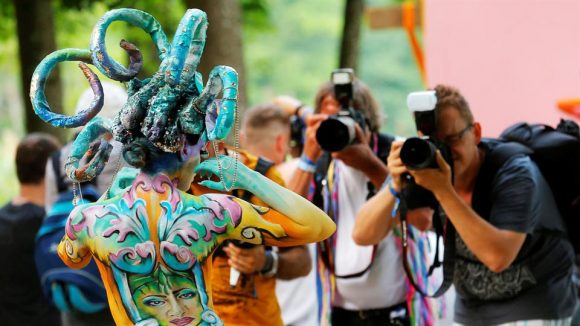
Festival Mundial de Bodypainting en Pöertschach, Austria. Foto: Reuters
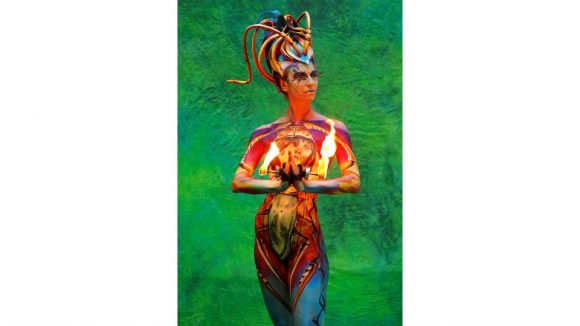
Una modelo posa durante el Festival Mundial de Bodypainting en Pöertschach, Austria. Foto: Reuters
s]

Festival Mundial de Bodypainting en Pöertschach, Austria. Foto: Reuters

Una modelo posa durante el Festival Mundial de Bodypainting en Pöertschach, Austria. Foto: Reuters
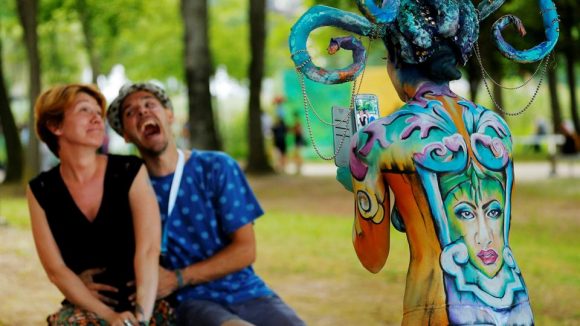
Festival Mundial de Bodypainting en Pöertschach, Austria. Foto: Reuters

Festival Mundial de Bodypainting en Pöertschach, Austria. Foto: Reuters

Festival Mundial de Bodypainting en Pöertschach, Austria. Foto: Reuters

Una modelo posa durante el Festival Mundial de Bodypainting en Pöertschach, Austria. Foto: Reuters

Una modelo con pintura fluorescente que brilla con la luz ultravioleta durante el Festival Mundial de Bodypainting en Pöertschach, Austria. Foto: Reuters
Politics as Marketing Campaign
- English
- Español
Politics as Marketing Campaign

By Manuel E. Yepe
http://manuelyepe.wordpress.com/
A CubaNews translation.
Edited by Walter Lippmann.
Since billionaire Donald Trump announced his candidacy for the Republican Party nomination for President of the United States, his speeches have been dedicated to the rejection of illegal immigrants –and the threat they allegedly pose to the economy and stability of his country– has formed an inseparable part of his political platform and election prospects.
“In US penitentiaries you will find that immigrants –legal or illegal– are just a quarter of the number of convicts that, statistically, they would correspond to considering their proportion in the US population. This means that “wetbacks” are four to five times less likely to commit a crime than Mr. Trump’s children.”
The above paragraph is part of an open letter to the –quite likely– Republican candidate for President of the United States, Donald Trump, which was sent by Jorge Majfud, the Uruguayan writer and professor of Latin American literature at the American University of Georgia.
“For centuries, long before your grandparents came from Germany and had great success in the hotel and brothel business in New York, and long before your mother arrived from Scotland, Mexicans had their families here and had already given names to all the Western states, rivers, valleys, mountains and cities. California architecture and the Texas cowboy –symbols of authentic US Americans– are nothing but the result of the hybridization of the new Anglo-Saxon culture with the long-established Mexican culture. “
“When your mother came to this country in the 1930s, half a million Mexican-Americans were expelled from their land. Most of them were US citizens, but had the misfortune that the national frustration of the Great Depression –which they did not create–labeled them as foreigners. These people had been branded foreigners and rapists (as you describe them) since the United States seized half the territory of Mexico in the mid-nineteenth century. And since those people who were already there would not stop speaking a barbarous language (Spanish), and refused to change the color of their skin, they were persecuted, expelled, or simply murdered, accused of being bandits, rapists and foreign invaders.”
“The real Zorro was dark-skinned and did not fight against Mexican despotism (as Johnston McCulley wrote to sell the story to Hollywood), but against the invading Anglo-Saxons who seized their land. He was dark and rebellious like Jesus, although in religious paintings you always see the man from Nazareth as blond, blue-eyed, and rather submissive. The hegemonic power of the time that crucified him had obvious political reasons for doing so. And it continued crucifying him three centuries later when Christians were no longer persecuted illegal immigrants who hid in the catacombs, and became the official persecutors of those in power.”
“European immigrants –like your parents and current wife—did not appear to be foreigners; but if your mother had come forty years earlier, she might have been mistaken for Irish; and these had indeed been branded invaders,” wrote Majfud. “The creativity of US business men and women is admirable, but its importance is overrated, and the fact that it was not businesspeople who promoted democracy in Latin America –but quite the opposite—is forgotten. There have been several US companies which have promoted coups d’état and have supported a long list of dictatorships.”
“There were businessmen, like Henry Ford, who made interesting contributions to industry; but it should not be forgotten that, like many other entrepreneurs in this country, Ford was a declared anti-Semite who collaborated with Hitler when shelter was denied to the Jews persecuted in Germany, while consortiums such as ALCOA and Texaco collaborated with the fascist regimes.”
Majfud reminds Trump that part of the current basic scientific knowledge was contributed centuries ago by those “horrible and primitive Arabs”; and that we owe to them the numbers we use, as well as algebra, algorithms, and many other sciences and philosophies that are part of Western culture today.“It was not businesspeople who managed, with their active resistance and popular struggle, the progress in civil rights that the US enjoys today. It was other patriots who, in their time, were demonized as dangerous, rioters, and anti-American.”
“Mr. Trump: a country is not a company. You have turned US politics (where intellectuals have never been abundant) into a perfect commercial marketing campaign whose main slogan against immigrants has not been a good choice.” Majfud concludes.
June 28, 2016.
LA POLÍTICA COMO CAMPAÑA DE MARKETING

Por Manuel E. Yepe
http://manuelyepe.wordpress.com/
Desde que el multimillonario Donald Trump anunció su candidatura por el partido Republicano a la presidencia de Estados Unidos, ha formado parte inseparable de su plataforma política y sus posibilidades electorales su discurso dedicado al rechazo a los inmigrantes ilegales y a la amenaza que éstos supuestamente representan para la economía y la estabilidad de su país.
“En las penitenciarías de Estados Unidos usted encontrará que los inmigrantes -legales o ilegales- son apenas una cuarta parte del número de los convictos que estadísticamente les correspondería de acuerdo a su proporción respecto a la población estadounidense. Eso significa que “los espaldas mojadas” tienen de cuatro a cinco veces menos posibilidades de cometer un delito que los hijos del señor Trump”.
El párrafo anterior forma parte de la carta abierta al muy probable candidato republicano a presidente de los Estados Unidos, Donald Trump, que le destinara el escritor y profesor uruguayo de literatura latinoamericana en la universidad norteamericana de Georgia, Jorge Majfud.
“Por siglos, mucho antes que sus abuelos llegaran de Alemania y tuviesen gran éxito en el negocio de los hoteles y los prostíbulos en Nueva York, y mucho antes que su madre llegara de Escocia, los mexicanos tenían aquí sus familias y ya habían dado nombre a todos los estados del Oeste, ríos, valles, montañas y ciudades. La arquitectura californiana y el cowboy texano, símbolo del auténtico norteamericano no son otra cosa que el resultado de la hibridez de la nueva cultura anglosajona con la largamente establecida cultura mexicana”. “Cuando su madre llegó a este país en los años 30, medio millón de mexicoamericanos fueron expulsados de sus tierras. La mayoría de ellos eran ciudadanos estadounidenses pero habían tenido la mala suerte de que la frustración nacional por la Gran Depresión, que ellos no inventaron, los encontrase con talante de extranjeros. Esa gente había tenido cara de extranjeros y de violadores (como usted los califica) desde que Estados Unidos se apropió de la mitad del territorio mexicano a mediados del siglo XIX. Y como esa gente, que ya estaba ahí, no dejaba de hablar un idioma bárbaro (el español) y se negaban a cambiar el color de su piel, fueron perseguidos, expulsados o simplemente asesinados, acusados de ser bandidos, violadores y extranjeros invasores.
“El verdadero Zorro era moreno y no luchaba contra el despotismo mexicano (como lo puso Johnston McCulley para poder vender la historia a Hollywood) sino contra los anglosajones invasores que tomaron sus tierras. Era moreno y rebelde como Jesús, aunque en las sagradas pinturas usted vea siempre al Nazareno rubio, de ojos azules, y más bien sumiso. El poder hegemónico de la época que lo crucificó tenía obvias razones políticas para hacerlo. Y lo siguió crucificando cuando tres siglos más tarde los cristianos dejaron de ser inmigrantes ilegales perseguidos que se escondían en las catacumbas, y se convirtieron en perseguidores oficiales del poder de turno.” Los inmigrantes europeos, como sus padres y su esposa actual, dice Majfud a Trump, no aparentaban ser extranjeros, pero si su madre hubiese llegado cuarenta años antes, tal vez hubiese sido confundida con irlandeses, que sí tenían cara de invasores.
La creatividad de los hombres y mujeres de negocios de EE.UU. es admirable -sigue diciendo Jorge Majfud-, pero se exagera su importancia y se olvida que no fueron empresarios quienes promovieron la democracia en Latinoamérica, todo lo contrario. Han sido varias las empresas estadounidenses que han promovido golpes de Estado y que apoyaron a una larga lista de dictaduras.
Fueron hombres de negocios quienes, como Henry Ford, hicieron interesantes aportes a la industria, pero no debe olvidarse que, como muchos otros empresarios de este país, Ford fue un antisemita declarado que colaboró con Hitler cuando se negaba refugio a los judíos perseguidos en Alemania, mientras consorcios como ALCOA y Texaco colaboraban con los regímenes fascistas.
Majfud recuerda a Trump que una parte de los conocimientos científicos básicos actuales, fueron fundados siglos atrás por esos “horribles y primitivos árabes” y que a ellos debemos los números que usamos, el álgebra, los algoritmos, y muchas otros ciencias y filosofías que hoy forman parte de la cultura de Occidente.
No fueron hombres de negocios los que lograron, con su acción de resistencia y lucha popular, el progreso de los derechos civiles que conoce hoy Estados Unidos. Fueron otros patriotas que, en su época, fueron demonizados como peligrosos, revoltosos y antiamericanos. “Señor Trump, un país no es una empresa. Usted ha convertido la política estadounidense (en la que nunca han abundado los intelectuales) en una perfecta campaña de marketing comercial donde su eslogan principal contra inmigrantes no ha sido muy feliz”, concluye Majfud.
Junio 28 de 2016.
Bernie Sanders and the New Times
- English
- Español
Bernie Sanders and the New Times

By Manuel E. Yepe
http://manuelyepe.wordpress.com/
A CubaNews translation.
Edited by Walter Lippmann.
Instead of calling on his followers to abandon the electoral struggle, or asking them to massively support Hillary Clinton´s campaign, Bernie Sanders has called them to follow him in new battles consistent with the ideas he has championed and that made him the big surprise of the current US presidential elections, especially because of his influence on the younger adult segment in US society.
On June 16, According to The Nation, Sen. Bernie Sanders made a speech on the future of his political revolution that turned out to be very different from what US electoral experts predicted. It was not an explanatory statement resulting from his defeat in the Democratic Party primaries for the November elections by former first lady and former State Secretary Hillary Clinton.
Paradoxically, his words were an invitation to his millions of followers, supporters and all citizens interested in defeating Donald Trump, to continue to confront Hillary Clinton and, after obtaining political power, continuing the struggle for social justice, economic honesty, civil rights, gay rights, equality of women and respect for the environment.
Sanders reminded his followers of their extraordinary achievements and noted that his campaign had gained the support of an enormous number of “persons age 45 years or less.”
Without mentioning Hillary Clinton in the first half of his speech, he stressed that “defeating Donald Trump cannot be our only goal.” Sanders was particularly transparent, both about what is at stake in the election as about his role in that fight.
“The major political task that we face in the next five months is to make certain that Donald Trump is defeated and defeated badly,” Sanders said. “And I personally intend to begin my role in that process in a very short period of time. If we do not do it soon, the breaches of commitments of a progressive nature made by Hillary Clinton in her campaign could go unnoticed without being denounced as opportunistic presumptions,” he said.
Sanders said –as he has maintained since his candidacy was “just a flea in the polls”– that his campaign “has never been for the election of a particular candidate; it has always been to transform the United States.”
He explained that whoever wins in November, it will be of no consequence if the president-elect had not previously been committed to such transformations, namely: ending the disgrace of child poverty, excluding big money from politics, ensuring that the rich pay their fair share of taxes, making health care a human right, and ensuring that higher education is not dependent on income or wealth.
Through an effective commitment to these purposes, this election could mark a turning point in US politics and national life.
However, Sanders said it is clear that for the United States to make that turn, the Democratic Party would first have to be transformed from am electoral machine that exchanges corporate money for votes and influence, into “a party of workers and young people, and not just of the wealthy contributors to its campaigns. It would have to become a party with enough courage to move against Wall Street, the pharmaceutical industry, the fossil fuel industry and other powerful special interests that dominate our political and economic life “.
Disregarding what some of his most fervent followers may have desired or preferred, Sanders has never shown any interest on playing the role of spoiler. On the contrary, by establishing an agenda for his enthusiastic cooperation with Hillary Clinton, he gave her the opportunity to confirm that his repeated assertion that he is a “progressive person who does things” is more than mere rhetoric.
At a slightly longer term, the “political revolution” that Sanders’ campaign introduced into the US lexicon made possible the emergence –in the imagination of ordinary citizens—of the prospect of building a powerful movement capable of ending oligarchic control of national life.
The call to “socialism” also made the dreams of many Americans become real expectations for the future, as alternatives that are within their reach.
Some experts have noted that these statements are not new to Sanders, and thus show that it was not he who has changed, but the times.
June 22, 2016.
BERNIE SANDERS Y LOS NUEVOS TIEMPOS

Por Manuel E. Yepe
http://manuelyepe.wordpress.com/
En lugar de llamar a sus seguidores a abandonar la lucha electoral o convocarlos a asumir masivamente la campaña de Hillary Clinton, Bernie Sanders les ha emplazado a que le sigan en nuevas batallas
consecuentes con las ideas que él ha defendido y que le han valido convertirse en la gran sorpresa de las actuales elecciones
presidenciales estadounidenses, especialmente por su influencia en el segmento más joven de los adultos en la sociedad.
Según el diario The Nation, el 16 de junio el senador Bernie Sanders formuló un discurso sobre el futuro de su revolución política que resultó muy diferente de lo que pronosticaban los expertos cronistas electorales de Estados Unidos. No fue una oración justificativa derivada del hecho de haber sido él superado en las primarias del partido demócrata para las elecciones presidenciales de noviembre por su homóloga demócrata en el senado, la ex primera dama y ex secretaria de estado Hillary Clinton.
Paradójicamente, sus palabras fueron una invitación a sus millones de seguidores, simpatizantes y a cualquier ciudadano interesado en derrotar a Donald Trump, a seguir enfrentados a Hillary Clinton y, una vez obtenido el poder político, continuar en la lucha por la justicia social, la honestidad económica, los derechos civiles, los derechos de los gays, la igualdad de las mujeres y el respeto al medio ambiente. Sanders recordó a sus seguidores los extraordinarios logros alcanzados y señaló que su campaña había obtenido la preferencia de una enorme cantidad de “personas de 45 años de edad o menos”.
Sin mencionar a Hillary Clinton hasta más allá de la mitad de su disertación, subrayó que “derrotar a Donald Trump no puede ser nuestra única meta”. Sanders fue particularmente transparente, tanto acerca de lo que está en juego en las elecciones como en su propio papel en esa lucha. “La tarea política principal que enfrentaremos en los próximos cinco meses será la de asegurarnos que Donald Trump sea derrotado… y derrotado de manera rotunda”.
“Personalmente, voy a comenzar a desempeñar mi papel en ese proceso dentro de muy breve tiempo. Si no lo hacemos pronto, los incumplimientos de los compromisos de carácter progresista que contrajo Hillary Clinton en la campaña podrían pasar inadvertidos sin ser denunciados como presunciones oportunistas”, precisó.
Sanders ha dicho – y ha mantenido desde que su candidatura era “apenas una pulga en las encuestas” – que su campaña “nunca ha sido para la elección de un candidato en particular; siempre ha sido para transformar a Estados Unidos.”
Ha señalado que tendrá poca importancia quien gane en noviembre si el presidente que sea electo no se ha comprometido previamente con esa transformación para poner fin a la deshonra de la pobreza infantil, a la exclusión del gran capital de la política, a asegurar que los ricos paguen su parte justa de los impuestos, a hacer de la atención de salud un derecho humano y a lograr que la educación superior no dependa de los ingresos o la riqueza.
Mediante un compromiso efectivo con dichos propósitos, sin embargo, estos comicios podrían marcar un giro decisivo en la política y la vida nacional.
Sin embargo, Sanders ha afirmado que es evidente que, para que Estados Unidos pueda dar ese giro, el partido demócrata tendría primero que transformarse, de maquinaria electoral que cambia dinero corporativo por votos e influencias, en “un partido de trabajadores y gente joven, y no sólo de ricos contribuyentes a sus campañas. Que se convierta en un partido con el coraje necesario para lanzarse contra Wall Street, la industria farmacéutica, la industria de combustibles fósiles y los demás poderosos intereses especiales que dominan nuestra vida política y económica”.
Sin importar lo que algunos de sus más fervientes seguidores pueden haber deseado o preferido, Sanders nunca ha mostrado ningún interés por jugar un papel de aguafiestas. Por el contrario, al establecer una agenda para su cooperación entusiasta con Hillary Clinton, le dio a ésta la oportunidad de comprobar que su reiterada afirmación de que él es un “progresista que hace cosas” es más que mera retórica. A un poco más largo plazo, la “revolución política” que la campaña de Sanders introdujo en el léxico estadounidense hizo posible que en el imaginario del ciudadano común apareciera la posibilidad de construir un poderoso movimiento capaz de poner fin al control oligárquico de la vida nacional.
La invocación al “socialismo”, además, convirtió los sueños de muchos estadounidenses en expectativas reales para el futuro, como
alternativas que están a su alcance.
Algunos expertos han hecho notar que estas consignas no son nuevas en Sanders para demostrar que no ha sido él quien ha cambiado, sino los tiempos.
Junio 22 de 2016.
Subscribe to Blog via Email
| M | T | W | T | F | S | S |
|---|---|---|---|---|---|---|
| 1 | 2 | 3 | 4 | 5 | 6 | 7 |
| 8 | 9 | 10 | 11 | 12 | 13 | 14 |
| 15 | 16 | 17 | 18 | 19 | 20 | 21 |
| 22 | 23 | 24 | 25 | 26 | 27 | 28 |
| 29 | 30 | |||||


You must be logged in to post a comment.